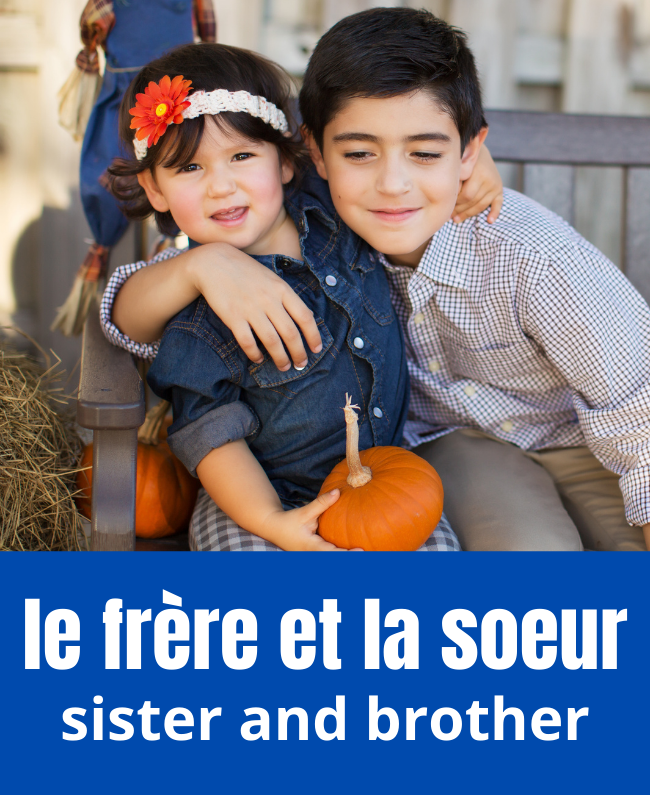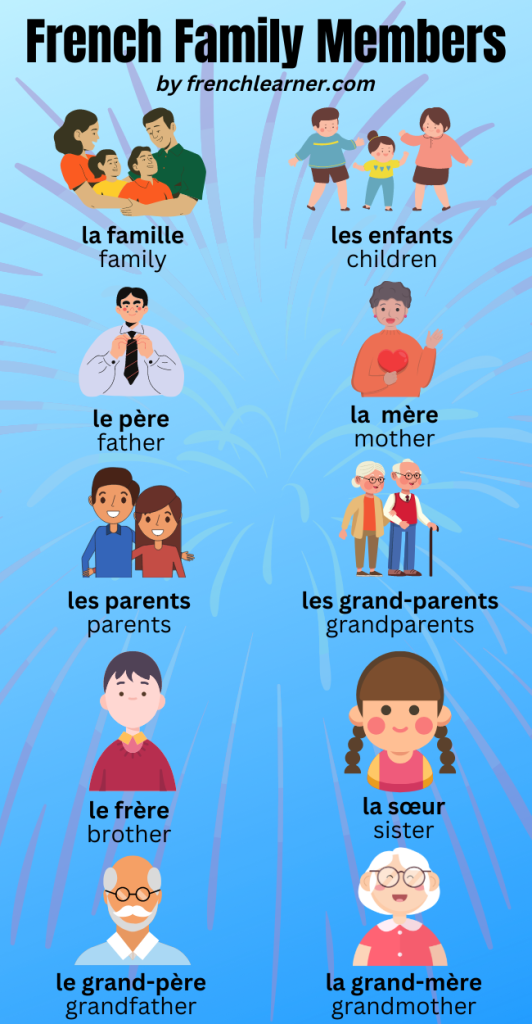This post provides a comprehensive list of French family vocabulary. We cover words for both close and extended family members. We suggest listenting to the audio for each family member. By the time you’re done going down the page you’ll have a very strong grasp of these words.
Family in French is la famille. Essential vocabulary includes: la mère (mother), le père (father), la soeur (sister), le frère (brother), la fille (daugher), le fils (son), la tante (aunt), l’oncle (uncle), la grand-mère (grandmother) and le grand-père (grandfather).

French family vocabulary
Immediate family
The following list is for the members of the immediate family. The “è” on the words père (father), mère (mother) and frère (brother) has an “eh” sound. For the word fille (daughter), don’t pronounce the LL’s.
- Father le père
- Mother la mère
- Son le fils
- Daughter la fille
- Brother le frère
- Sister la soeur
- Husband le mari
- Wife la femme, l’épouse
- Husband l’époux, le mari

Extended family
The following is a list of extended family members. Notice that the word for grandmother is “la grand-mère“. Be sure not to add an -e to “grand” to make it feminine. For the great grandparents, attach the word “arrière”.
- Grandparents les grand-parents
- Grandfather le grand-père
- Grandmother la grand-mère
- Great-grandfather l’arrière-grand-père
- Great-grandmother l’arrière-grand-mère
- Grandchildren les petits-enfants
- Grandson le petit-fils
- Granddaughter la petite-fille
- Uncle l’oncle
- Aunt la tante
- Great-uncle le grand-oncle
- Great-aunt la grand-tante
- Nephew le neveu
- niece la nièce
- male cousin le cousin
- female cousin la cousine

In-laws and step family
La belle-famille refers to the in-laws. When describing family members by marriage, the French do not distinguish between in-laws and step. For example, “le beau-père” means both father-in-law and step-father.
Interestingly, “le demi-frère” translates to both half brother and step brother. Logically, “la demi-soeur” translates to half sister and step sister.
- Parents-in-law les beaux-parents
- Father-in-law, step-father le beau-père
- Mother-in-law, step-mother la belle-mère
- Son-in-law, step-son le beau-fils
- Daughter-in-law, step-daughter la belle-fille
- Half-brother, step brother le demi-frère
- Half-sister, step sister la demi-soeur
Advanced French family vocabulary
French has some advanced family terms which are necessary to learn.
L’aîné – As a noun, l’aîné(e) means eldest child. As an adjective it means ‘older than’ or ‘your senior’.
- Marie est l’aînée de la famille. Elle a 35 ans. Marie is the eldest child in the family. She’s 35 years-old.
- Joseph est mon aîné de cinq ans. Joseph is five years older than me.
Le cadet – As a noun, le cadet/la cadette means the youngest child. As an adjective, it means younger. Le cadet can also refer to the second-born child.
- Notre cadet habite encore à la maison. Our youngest child still lives at home.
- Ma soeur cadette s’appelle Julie. My younger sister’s name is Julie.
Le benjamin – Le benjamin/la benjamine also refers to the youngest child in the family.
- Sophie est la benjamine de la famille : elle n’a que trois ans. Sophie is the youngest in the family. She’s only three years-old.
Adoption and fostering
The following list covers adoption and fostering. French culture places a heavy emphasis on the godparents. Hence, you’ll often hear French people referring to “mon parrain” (my godfather) and “ma marraine” (my godmother.
- Adoptive father – père adoptif
- Adoptive mother – mère adoptive
- Biological parents – les parents biologiques
- Biological father – le père biologique
- Biological mother – la mère biologique
- Foster family – la famille d’accueil
- Foster mother – la mère de la famille d’accueil
- Foster father – le père de la famille d’accueil
- Godfather – le parrain
- Godmother – la marraine
- Godson – le filleul
- Goddaughter – la filleule

How to introduce family members
The following list of short phrases can come in handy for introducing family members in social situations. “Je vous présente” is formal and translates to “I introduce you to”. The informal version for people you know better is “Je te présent”.
- This my wife. Je vous présente ma femme.
- This is my husband. Je vous présente mon mari.
- These are my kids. Je vous présente mes enfants.
- This is my daugher/son. Je vous présente ma fille/mon fils.
- This is my sister/brother. Je vous présente ma soeur/mon frère.
- This is my mother/father. Je vous présente mon père/ma mère.
Genealogy and distant relatives
If you are traveling to France with the intention of looking for distant relatives the following list covering genealogy and family trees will come in handy.
- genealogy la généalogie
- direct line of descent la filiation
- family tree un arbre généalogique
- ancestry, bloodline, lineage l’ascendance (f)
- generation une génération
- ancestors les ancêtres, les aïeux
- distant relative un(e) parent(e) éloigné(e)
- relationship, kinship la parenté
- first cousin un(e) cousin(e) germain
- second cousin un(e) cousin(e) issu de germain
- once removed au deuxième degré
- paternal (adj) paternel(le)
- maternal (adj) maternel(le)
- DNA le AND
Conclusion
Et voilà ! You now know how to talk about your family in French. We now suggest checking out French Today’s family vocabulary lesson!

See all French vocabulary lists

